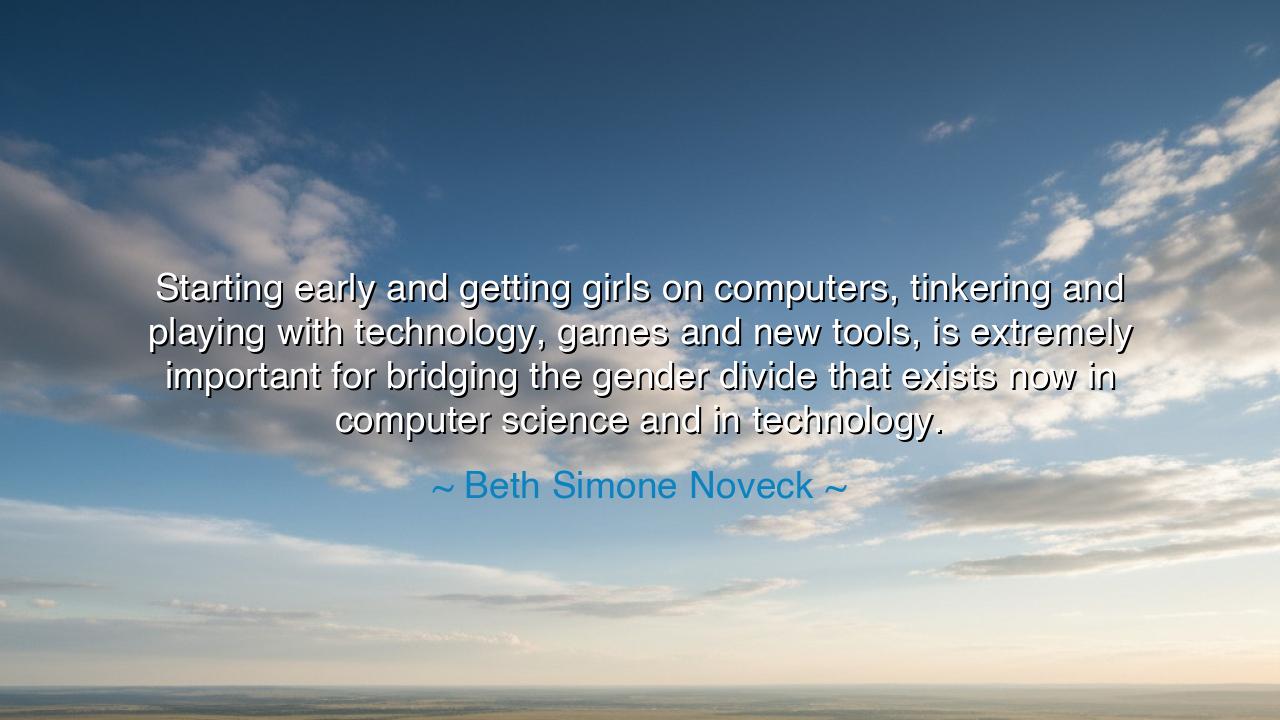
Starting early and getting girls on computers, tinkering and
Starting early and getting girls on computers, tinkering and playing with technology, games and new tools, is extremely important for bridging the gender divide that exists now in computer science and in technology.






“Starting early and getting girls on computers, tinkering and playing with technology, games and new tools, is extremely important for bridging the gender divide that exists now in computer science and in technology.” Thus spoke Beth Simone Noveck, a thinker and leader of the digital age, whose words shine like a beacon through the mist of inequality. In her voice is the urgency of one who sees both the danger of exclusion and the promise of possibility — the conviction that the future must not belong to one half of humankind alone. Her call is not merely for access, but for awakening — to kindle the spark of curiosity in young girls, so that they too may become the builders, creators, and dreamers of the technological world.
In the ancient days, wisdom was passed from teacher to student through story, through touch, through the shaping of clay and the weaving of cloth. The crafts of the world were open to those whose hands dared to learn. But in our modern age, the new craft — the shaping of code, the architecture of machines — too often stands behind invisible gates. The gender divide, born of centuries of silence, whispers to young girls that they do not belong among circuits and codes. Noveck, seeing this injustice, calls upon us to begin early, before the walls are built, before doubt takes root. For a child who plays with tools will one day wield them; a girl who experiments freely with technology will one day command it.
The origin of Noveck’s wisdom lies in both observation and hope. As a scholar of governance and innovation, she witnessed the power of technology to transform societies — yet she also saw that this power was unevenly shared. The world of computer science, the new engine of civilization, remained largely shaped by men, while women — once the pioneers of early programming — were pushed aside. The irony is ancient: the very daughters of Ada Lovelace, who in the 1800s wrote the first algorithm, were later told that the digital realm was not theirs. Noveck’s words are a summons to return to that rightful inheritance.
Consider the story of Grace Hopper, a woman of the mid-twentieth century who built not only programs but the language of programming itself. She was told she did not belong, that computers were machines for men and soldiers. Yet she persisted, inventing the compiler that would give birth to modern coding languages. She once said, “The most dangerous phrase in the language is: ‘We’ve always done it this way.’” And in that defiance, she became what Noveck now urges young girls to become — tinkerers, explorers, fearless inventors of the unseen. Hopper’s legacy reminds us that brilliance knows no gender, only opportunity.
Noveck’s quote also carries a deeper spiritual truth: that to create is to belong. The act of tinkering, of experimenting without fear of failure, is the seed of mastery. When a child — girl or boy — is invited to explore, they learn not only technology but confidence. But when one half of humanity is told that exploration is not for them, the entire species is diminished. The bridging of the gender divide is not a favor to women; it is a restoration of balance to the world itself. Each time a young girl writes her first line of code, she does not merely learn a skill — she reshapes the future of innovation, empathy, and equality.
Yet, as Noveck teaches, this transformation cannot begin in adulthood, when barriers are already built and courage has begun to wane. It must begin early, in the age of play, when curiosity still reigns and fear has not yet taken root. For in play, there is freedom; in freedom, discovery. If we wait too long, the voices of girls may be drowned out by the chorus of “you can’t” and “you shouldn’t.” But if we start early — placing tools in their hands, letting them build, fail, and dream — they will never again doubt their right to shape the world.
So the lesson, O listener of the digital dawn, is clear: open the gates of creation early, and open them wide. Give every child, regardless of gender, the chance to play with the tools of the age. Encourage the daughters to build and break, to question and to code. In doing so, we do not only empower individuals — we strengthen the very fabric of progress. The wisdom of Beth Simone Noveck is the wisdom of all ages: that equality must begin not with laws alone, but with learning, and that the destiny of civilization rests in the hands of those who dare to tinker.
Therefore, let this be remembered and passed down: begin early, teach boldly, and dream inclusively. For the world of technology is not complete until all minds — male and female alike — are free to shape it. When the daughters of tomorrow sit beside the sons of innovation as equals, the great divide will close, and humanity will finally see what it was always meant to be — whole, balanced, and endlessly creative.






AAdministratorAdministrator
Welcome, honored guests. Please leave a comment, we will respond soon